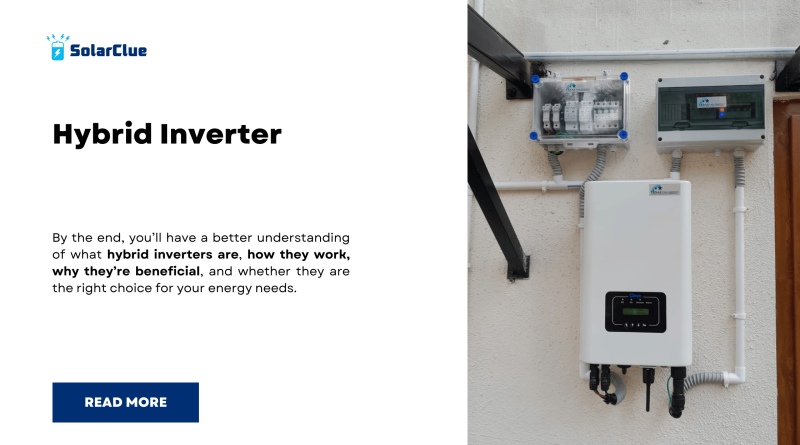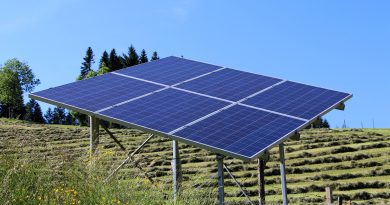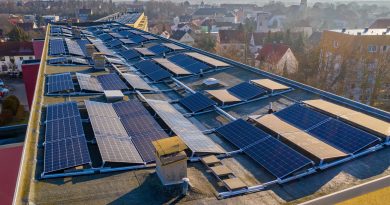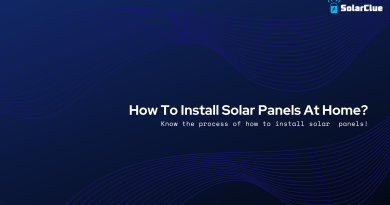Hybrid Inverter
In today’s world, energy is something we can’t live without. Whether it’s for your home, office, or any other space, the power we use comes at a cost—both financially and environmentally. This is where hybrid inverters come into play. They are like the “middle-man” between traditional electricity sources and renewable energy sources like solar power. If you’ve ever wondered how you can cut down on energy costs or contribute to a greener planet, then a hybrid inverter could be the solution you’re looking for.
In this blog post, we’ll break down everything you need to know about hybrid inverters in simple terms. By the end, you’ll have a better understanding of what hybrid inverters are, how they work, why they’re beneficial, and whether they are the right choice for your energy needs.
Table of Contents
What Is a Hybrid Inverter?
A hybrid inverter is an energy conversion device that allows you to use both grid electricity and renewable energy sources, such as solar panels, in a balanced way. Unlike traditional inverters, which only convert direct current (DC) from solar panels into alternating current (AC) to be used by your home or business, a hybrid inverter does much more.
It combines the features of a standard inverter with the capabilities of a battery storage system. This means you can store excess energy generated by your solar panels for later use, which can come in handy when the sun isn’t shining or during power outages.
Think of it like a smart energy manager for your home. A hybrid inverter allows you to draw power from three sources:
- The grid (traditional power supply)
- Your solar panels (renewable energy)
- Battery storage (stored solar energy)
This setup ensures that you always have power when you need it, while also helping you save on energy costs and reduce your reliance on fossil fuels.
How Does a Hybrid Inverter Work?
The working of a hybrid inverter is simple but effective. Here’s a step-by-step breakdown:
- Solar Energy Generation: During the day, solar panels capture sunlight and convert it into direct current (DC).
- Conversion: The hybrid inverter converts this DC into alternating current (AC) that your home or business can use for powering devices and appliances.
- Battery Charging: If the solar panels produce more energy than is needed at the moment, the extra energy is stored in a battery system for later use.
- Grid Interaction: If your solar panels are not generating enough energy (like during cloudy days or at night), the hybrid inverter will switch to drawing power from the grid or from the battery, whichever is more efficient.
- Energy Export: If your solar panels are generating excess energy, and your battery is fully charged, some hybrid inverters can export the excess power back to the grid, potentially earning you credits from your utility company.
Benefits of Using a Hybrid Inverter
There are numerous reasons why a hybrid inverter is a great choice for energy management. Let’s take a look at some key benefits:
1. Energy Savings
By utilizing solar energy and reducing your dependence on grid electricity, you can significantly cut down on your energy bills. Storing excess energy for later use also ensures that you’re making the most of every bit of sunlight your panels capture.
2. Backup Power
One of the main advantages of hybrid inverters is their ability to provide backup power during outages. Since they are paired with a battery storage system, you’ll always have stored energy to rely on when the grid goes down.
3. Maximizing Solar Usage
Traditional inverters can only use the solar energy that’s generated in real-time. Hybrid inverters, on the other hand, store the energy for later use. This means you can use solar power even when the sun isn’t shining, maximizing the value of your solar panel investment.
4. Environmental Benefits
By reducing reliance on grid electricity, which is often generated using fossil fuels, hybrid inverters contribute to lowering your carbon footprint. Using more renewable energy and less traditional electricity is a step toward a greener planet.
5. Energy Independence
With a hybrid inverter system, you become less dependent on the grid. This gives you more control over your energy supply, especially during high-demand periods or peak grid usage times when electricity costs tend to rise.
6. Smart Energy Management
Some hybrid inverters come with smart features that allow you to monitor your energy usage, production, and storage. These systems can be connected to apps or devices that let you optimize when to use grid power or solar energy, further improving efficiency.
Types of Hybrid Inverters
Hybrid inverters come in various sizes and configurations, depending on your energy needs. Here’s a quick breakdown of the most common types:
- Single-phase Hybrid Inverter: Ideal for residential homes, these inverters provide power to single-phase electrical systems, which is common in most households.
- Three-phase Hybrid Inverter: These are used in larger homes or commercial spaces that require more power. They distribute energy across three phases of power, providing a more balanced energy supply.
- Off-grid Hybrid Inverter: If you live in a remote location without access to the grid, an off-grid hybrid inverter is designed to provide continuous power using only solar energy and battery storage.
Challenges of Hybrid Inverters
While hybrid inverters are a fantastic choice for many, they aren’t without their challenges. Here are a few things to consider:
- Initial Cost: The upfront investment for a hybrid inverter system can be higher than that of a traditional inverter system. However, the long-term savings on energy bills and environmental benefits can make this cost worthwhile.
- Complex Installation: Installing a hybrid inverter system can be more complex than installing a regular inverter. You’ll need professional installation to ensure everything works properly, which can add to the cost.
- Battery Life: The performance of a hybrid inverter depends heavily on the quality of the battery. Over time, batteries may degrade, and replacing them can be expensive.
Hybrid Inverter vs. Traditional Inverter:
| Feature | Hybrid Inverter | Traditional Inverter |
|---|---|---|
| Energy Source | Solar, grid, and battery | Solar or grid |
| Backup Power | Yes, with battery storage | No |
| Energy Storage | Stores excess energy in battery | No storage |
| Cost | Higher initial cost | Lower initial cost |
| Efficiency | Higher due to energy storage | Lower as no energy storage |
| Environmental Impact | Lower carbon footprint | Relies more on grid electricity |
Is a Hybrid Inverter Right for You?
Whether or not you should invest in a hybrid inverter depends on your energy needs and budget. If you live in an area with frequent power outages, want to reduce your energy bills, or are looking to go greener, a hybrid inverter is a great option. On the other hand, if the initial cost is a concern and you don’t experience many power outages, you might be better off starting with a traditional solar inverter and upgrading later.
Conclusion
Hybrid inverters are an excellent solution for anyone looking to optimize energy use, cut down on bills, and reduce their carbon footprint. While the initial investment may be higher than a traditional inverter, the long-term savings, backup power, and environmental benefits often outweigh the cost. Whether you’re looking to upgrade your existing solar system or start fresh with a hybrid setup, these smart inverters offer an efficient, reliable, and eco-friendly solution.
Visit SolarClue® to see the best Solar Inverters. SolarClue® actively sells solar energy products at discounts of up to 50% on its online marketplace.
FAQs
1. Can I use a hybrid inverter without a battery?
Yes, you can use a hybrid inverter without a battery. However, you won’t be able to store excess energy for later use, and the system will function more like a traditional solar inverter.
2. How long do hybrid inverters last?
On average, hybrid inverters last about 10-15 years. Proper maintenance and using high-quality components can extend their lifespan.
3. Is it worth investing in a hybrid inverter?
If you’re looking to save on energy costs, reduce your environmental impact, and have backup power during outages, a hybrid inverter is definitely worth considering.
4. Do hybrid inverters require maintenance?
Yes, like any electrical system, hybrid inverters require occasional maintenance to ensure optimal performance. This typically involves checking the battery and ensuring all connections are secure.
5. What is the cost of a hybrid inverter?
The cost of hybrid inverters varies depending on their size and features. They generally range from 83,930 to 4,19,660 or more, excluding installation.




